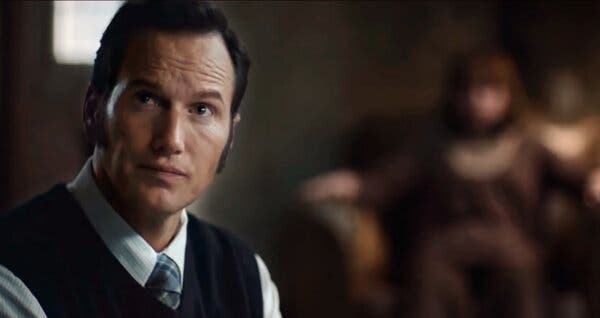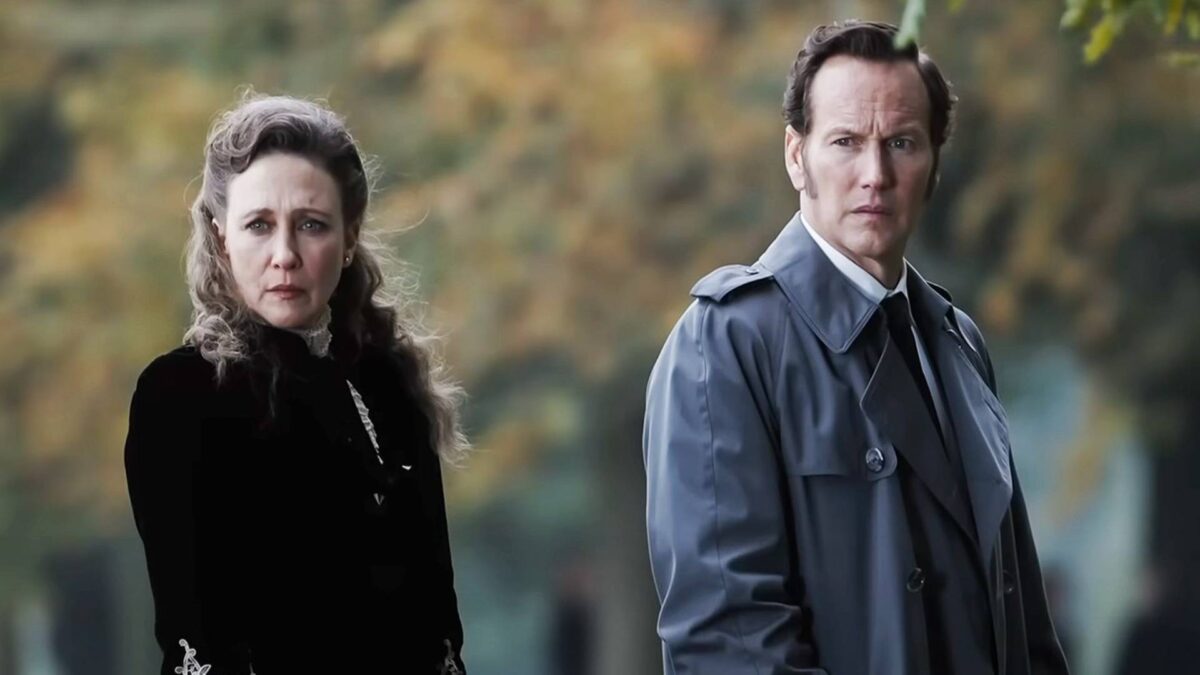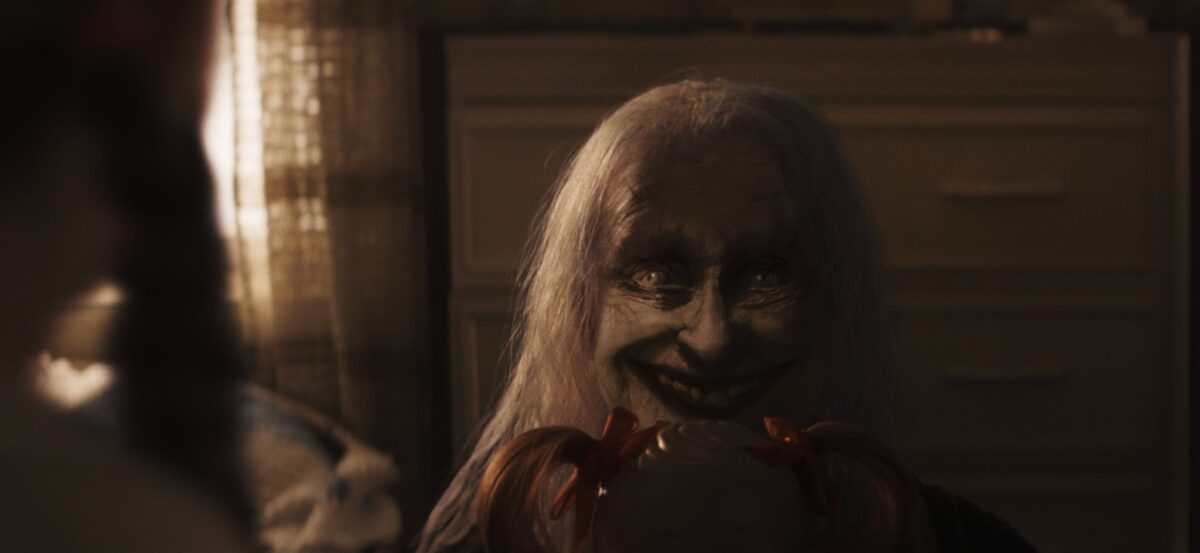
“Not every ghost is bad, maybe they just want to play” — Patrick Wilson on The Conjuring: Last Rites
Celeba.ch spoke exclusively with Patrick Wilson about the release of The Conjuring: Last Rites, the newest chapter of the iconic horror saga. The actor opened up about his journey as Ed Warren, working with Vera Farmiga, and the life lessons he took from real-life Lorraine Warren.
On July 19th, 2013, 12 years ago, the first Conjuring film was released in theaters. Did you have any inkling of the journey that would follow for you that day?
No, but that comes with an asterisk. James [Wan] and I knew that if we got the first one right, we’d at least be back for a second one. Now, doing four, and the success—four Conjurings and the Annabelles and Nuns—and seeing how wide the Universe has grown? No, I did not see that. From the get-go, I think because of the structure, it was just so ripe for the right kind of series. Following a family, you can have the family triumphs and lows, but each time a new case? That’s like a producer’s dream. It’s just so unusual for a horror franchise that usually either follows a victim or the killer, right? So not following either here, though I guess sometimes we’re victims. It just was set up in such an interesting and innovative way. And I knew in the right hands, which of course were those of James Wan, that we would at least get a couple. I did not think four, I did not think we’d have two with Michael Chaves either. So, this has been a blessing.
James Wan and Peter Safran, the architects of the Conjuring Universe: from where you sit, what is it that makes that creative pairing so successful?
Well, Peter was a long-time manager, and I think when you’re a creative person and you’re used to fostering creativity, especially with directors like James Gunn and James Wan, who had obviously had a very successful career already, but post-Insidious, you really saw him redefine even his own genre. And I think Peter saw someone—and I’ve never said this to Peter, so I’m just spit-balling—but I imagine he saw an artist that was willing, that had such respect for the genre, is so skilled as a filmmaker, and understood the audience. After what he did with Saw in his twenties, and then came back with a few movies in between, but came back with Insidious, appealing to a younger crowd and with some of arguably his greatest scares, I think you saw a filmmaker that was destined to keep redefining the genre, and Peter he gave him faith, right?
That’s all you want as an artist is someone that believes in your vision—pending that you have a strong vision—believes in your vision, and fosters that. And Peter’s obviously a very, very smart guy and a very creative guy. But I think his ability to foster that and fight for that with James, what he wanted this movie to be, he really thought, you can do it. So when James is like, “I want Conjuring to live like The Exorcist”—not necessarily, “I want to make 10 movies of these and have it be the biggest, most successful franchise”—but a timeless horror movie that appeals to a massive audience and not just horror people. And I think honestly, Peter just believed him and said, “Great, let’s do it.” I’m sure it wasn’t that simple, but it’s that faith that you want a partner to have in you. We all do.
And I think he found that, and both of them found it with each other because all the director wants is someone that’s going to fight for them. Someone that’s going to go to the studio and say, “No, no, no, no. You need to treat this—and I know there’s a lot of these tiny little horror movies that are working—but treat this like a proper film. Give them the days, give them the sets, give them the production design, give them the stages.” And it worked. It was at a time when there were so many horror movies. We had been in them and made them, which were much more low-budget. And really the studio system at that time with horror movies… there wasn’t a lot of proper credence given to horror films during that time.
Going back to that beginning, what was it about Ed Warren on the page that drew you to the role and what made that pairing so powerful, Ed and Lorraine?
Well, I think before we even approached the roles, I think Vera [Farmiga] and I just get each other, we get along. I know how seriously she takes her work, and I know how seriously she takes her family. And those are things that reflect in me as well. And those are things that reflect in the work, so it all sort of worked. I knew even going into the script, every question would come from a place of honesty and just wanting to make the best film that we could. I think as far as literally the character of Ed, I was fascinated by him. I love playing people that are steadfast in their beliefs, I would say, even though, and sometimes even because, they’re so far from mine. That is all you want in a character, something you can latch onto.

And the fact that he was so devout, the fact that he was so devoted to this cause, the fact that he believed in this stuff so much was like… I could hang my hat on that. That’s exciting to jump into because you know, with all the craziness going on, this guy’s going to be the rock. And I think that’s exciting to play because then it really gave us the balance, because Lorraine, obviously look at all the work that she’d done, but she was operating on literally a whole other plane. And so those opposites are beautiful to explore.
You got to know Lorraine Warren in real life. What did that mean to you?
It meant a ton. Those first two movies, we’d go up there before each movie and we’d spend time with her and Judy and Tony, and go in the artifact room and just wander around, play with the chickens, and there was always a priest there.
The priest who blessed the artifacts room regularly?
Right. And that gave us a lot of the color actually, a lot of those things that we saw we came back with, and I would call James. “Did you know Ed painted? He’s got paintings everywhere in the house. That’s how they kind of made their money early on, selling paintings. We got to have him paint.” So, then we started putting paintings in, in the second one he’s painting.
We saw the chickens in the house. We came back and before we started shooting the first film, James was like, “We’ve got to have chickens. They have chickens. The chickens are in the house. We got to have chickens.” Practically, production said, “We can’t have them in the house, but we’ll have chickens.” We’ve had chickens in every movie now. Rob Cowan, our producer, I think the legend has, he said to either James or another director, “Please don’t let them pitch ideas anymore because I’ve had get these chickens for every movie because Patrick and Vera want chickens.” [LAUGHS] We had very low demands, but we definitely wanted chickens.
But anyway, with Lorraine, we have her on film with us in that first scene, when I’m going through how Ed and Lorraine came into possession of Annabelle, she’s in the audience. That was really special. I remember we talked about ghosts and my own experiences, and she actually… if I really think about what she taught me, I don’t know what was taught, but I definitely know there’s now an awareness that I have.
I had mentioned to her that I had two different people at different times hear the same voices in my house. And this was a long time ago. Anytime anybody has some kind of thing that goes bump in the night, or says I heard something in that way, I’m very much like Ed in that I will think, “Nope, that’s probably a raccoon.” Of course, Vera’s the opposite. She’ll go, “This happened to me.” And I go, “I don’t believe it.” We are complete opposites in that regard. That being said, these two separate incidents that happened with these people were unrelated, but were the same story about hearing voices, kids’ voices. And my kids weren’t there at the time, so I brought this up to Lorraine, and she goes, “Well”—and I’ll misquote her, but the gist of it was—”Well, they probably just wanted to play.” And I was like, “They wanted to play?” And she’s like, “Yeah, not every ghost is bad.”
And I have carried that with me, so when someone tells me they hear something in my house, I’ll say, “All right, but why is it bad?” I feel like if I came back as a ghost, I would just want to hang out. I don’t want to scare anybody. So, whether that’s totally ridiculous, which is fine, it says something about me that I have literally developed this attitude over the years where if I hear a story about someone hearing voices, it doesn’t rattle me at all. Maybe they just want to play. Maybe they’re just friends. So that’s what she taught me. Don’t be afraid of it. You’re fine.
In this next chapter, The Conjuring: Last Rites, the stakes are higher than ever for Ed and Lorraine. Talk a little bit about the Smurls’ case and what brings Ed and Lorraine to their home?
Ed and Lorraine are at an age where we’re wondering what has been passed on to Judy. We’ve seen Judy grow older, that’s a real important part of this and that’s really the throughline that connects these two stories. If you remember from the third film where we are with Ed’s health, every time they would take a case and what it cost Lorraine, now what it’s costing him as well. Still, Ed doesn’t want to give up, and that’s the predicament that they’re in. But instead of Father Gordon finding a case for them, Father Gordon has become involved in this, and it goes south.

So, all of a sudden they have a whole different set of circumstances that they’re forced to deal with, I would say, which might be different than other cases. This is not just as simple as “there’s a family in need.” Yes, there’s a family in need, but there’s more than one family in need, that is the real answer there, so a lot is on the line, not only for the Smurls, but also for the Warrens.
You mentioned Judy, and while she’s been in all of the films in one way or another, she does have a much more critical role in this one. And now we meet Tony Spera for the first time in this film as well. So, tell me a little bit about what Mia Tomlinson and Ben Hardy bring to their roles in this one.
Yeah, they’re so great. What we really get into is the father-potential-son-in-law and mother-daughter relationships. That’s where we get a lot of the humor, we get a lot of the heart. And ultimately you see the love that Judy and Tony have for each other, and that of course is all any parent wants. As actors, it’s always really exciting to welcome new folks into our world. And certainly in these roles, it’s a much different feel. For the character of Judy, we’ve had some wonderful kids and young actors play the role over the years, not just in the Conjuring movies, but in Annabelle Comes Home. I think Mia’s very similar to Vera in a lot of ways. I think there’s this beautiful artsy kookiness in both of them that I adore and that comes through. And that’s very rewarding.
Ben’s certainly has quite a bit of experience now, but we haven’t met Tony like this; this really defines him, so it’s a great opportunity for Ben. And he really seizes the day. For Ed and Tony, it’s that older guy/younger guy dynamic, that’s one thing that we explore. And it’s the `80s, so it’s dealing with masculinity and the patriarchy and all these things that can seem kind of dated. Ed’s an old-fashioned guy, and I actually think people find that interesting. It’s very relatable to a lot of our audience. So when you see the new generation come in and how both of them have to find a middle ground, it’s both realistic and it’s pretty endearing. So that was really fun to explore.
And you’re back with Michael Chaves as your director. What’s one thing you love about working with him?
There’s always a joy and a love with Michael that supersedes his technical prowess, which is pretty great, he’s a very skilled director for sure. He gets excited, acting out our scenes before we do them, “And then you’ll go here and then you come in here.” He’s got complete skill and really shepherded this script to reflect that joy and that fervor that he has, which actually comes from his love for the series. He really wanted to honor the series, and have it payoff for people, the first one meant so much to them. How do you bookend that? And he found some creative ways that… not that you need to see the other films to see this, but if you have, especially the first one, you’re going to be very happy.
How are you feeling leaving Ed behind after inhabiting him for so long?
It’s a mixed bag, right? So hard. I am an actor who feels like I’ve got a lot left, so it’s hard for me to really let something go. But it’s not that I’m holding onto it, it’s just that we closed the door on a chapter of this. And I think part of it, too, I’ll be honest with you, why it’s so hard for me to answer that question is because I can’t imagine in a year and a half or whatever it’s going to be, not getting ready to work with Vera again. And really anybody that sees me every couple of years, who sees me on the street with my sideburns coming out, thinks, “Well, chances are he’s about to shoot a Conjuring,” so I don’t know if I’ll still kind of grow them just for my own sake. I probably will. [LAUGHS]
But honestly, that’s the thing that’s probably the hardest for me, to go, “I can totally understand it’s all over.” Because there’s still a side of me that’s like, “Well, I have to find something with Vera. I don’t know what we’re going to do.” I’m not retiring, so it’s so hard for me to separate Ed from Patrick. It’s me, Ed Warren is me. I don’t look at anything like the real Ed Warren, but my Ed Warren is me. So we’ll see.





